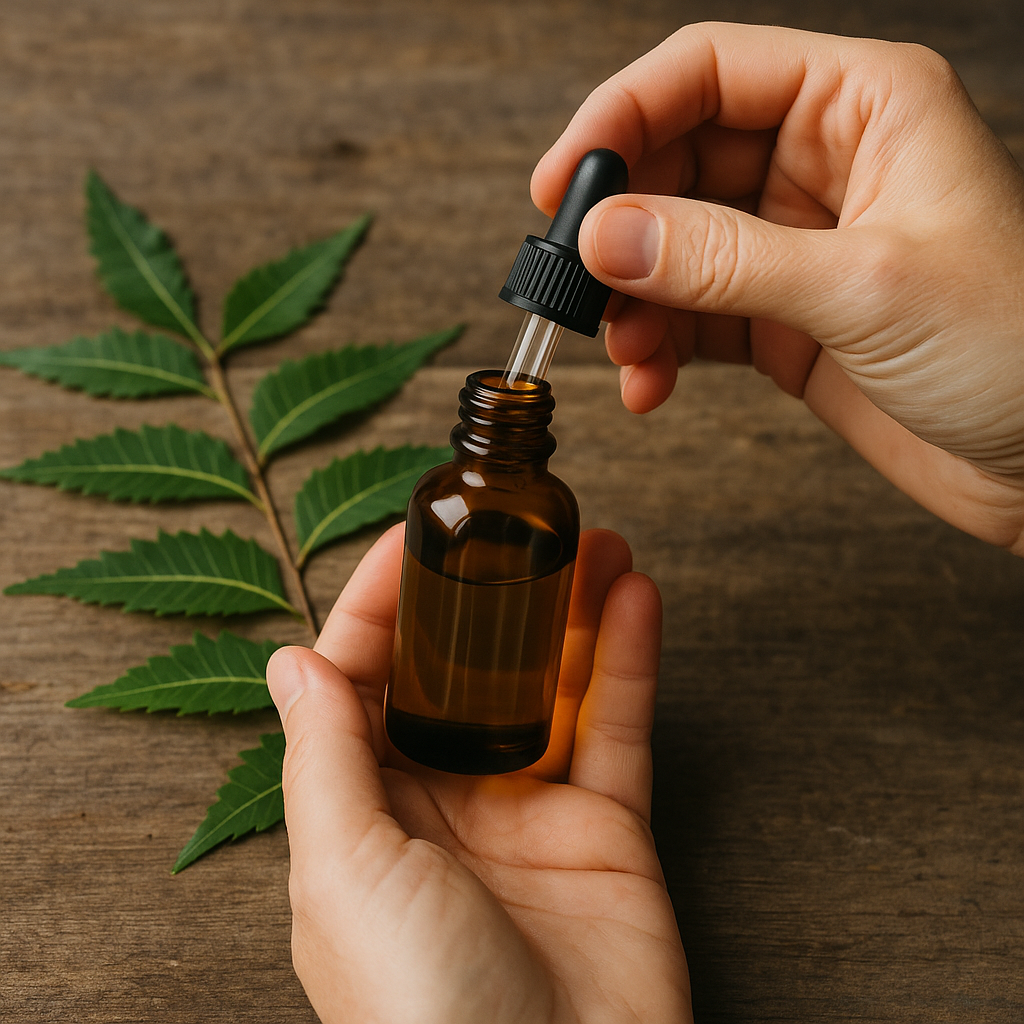Ask Ayurvedic doctor a question and get a consultation online on the problem of your concern in a free or paid mode. More than 2,000 experienced doctors work and wait for your questions on our site and help users to solve their health problems every day.
Shop Now in Our Store
What Is the Use of Neem in Ayurveda and Daily Life

Neem, often called the “village pharmacy,” has been an essential part of Ayurveda and daily life for centuries. But what is the use of neem that makes it so special? From its leaves to the oil extracted from its seeds, the neem tree offers a vast range of uses that have been celebrated not only in traditional healing but also in modern herbal practices. Whether you’re curious about the uses of neem leaves for skincare or the benefits of neem oil in treating infections, this article will guide you through the versatile uses of the neem plant and how you can include it in your own wellness routine.
The uses of neem tree are extensive, stretching beyond health to agriculture and personal care. This ancient plant is praised for its natural antibacterial, antifungal, and anti-inflammatory properties. What’s more, the use of neem is often considered safe and natural, making it a preferred choice for many who seek alternatives to chemical-laden products. So, if you’ve ever wondered how to use neem leaves, or the best way to incorporate neem powder or oil into your daily life, keep reading!

Common Uses of Neem in Ayurveda
Ayurveda, the ancient Indian system of medicine, heavily relies on neem for its healing properties. The plant is known for its ability to purify blood, detoxify the body, and balance the doshas — the fundamental energies believed to govern bodily functions. In Ayurveda, the uses of neem leaves and neem oil are considered vital for maintaining skin health, boosting immunity, and treating various infections.
Uses of Neem Leaves for Skin and Hair
One of the most popular uses of neem leaves in Ayurveda is for skin and hair care. Neem leaves are packed with compounds that help fight acne, reduce inflammation, and soothe irritated skin. People often make a paste of neem leaves to apply directly on pimples or rashes, providing relief from itching and redness. This is one of the easiest and most effective uses of neem leaves that you can try at home!
Besides skin care, neem leaves are also used to strengthen hair roots and prevent dandruff. Rinsing hair with neem leaf water is a traditional practice believed to promote healthy scalp and shiny hair. Though it might smell a bit strong, the benefits are worth it for those struggling with scalp issues. You can even mix neem leaf powder with coconut oil for a nourishing hair treatment.
Use of Neem Oil for Infections and Inflammation
Neem oil use dates back centuries, mainly due to its potent antimicrobial properties. The oil extracted from neem seeds contains compounds that help fight bacterial and fungal infections, making it a popular remedy for wounds, cuts, and even insect bites. Applying neem oil on infected skin can speed up healing and reduce inflammation.
Additionally, the use of neem oil extends to managing skin conditions like eczema and psoriasis. Its natural anti-inflammatory effects soothe irritated skin and help reduce redness. However, it’s important to dilute neem oil with a carrier oil before applying, as pure neem oil can be quite strong and might irritate sensitive skin.
Medicinal Benefits and Daily Uses of Neem Tree
The uses of neem tree go far beyond just skin and hair care. This incredible plant has been an integral part of traditional remedies for a wide range of ailments, reflecting its deep-rooted significance in natural medicine. From fighting infections to promoting overall wellness, the neem plant is a powerhouse of health benefits.
Uses of Neem Tree in Traditional Remedies
Traditionally, almost every part of the neem tree—bark, leaves, seeds, and flowers—has been utilized for medicinal purposes. For example, neem bark is often used to treat fevers and digestive problems, while neem flowers are believed to help control diabetes and boost liver function. The uses of neem in Ayurvedic and folk medicine are vast and diverse.
One particularly interesting use of neem is as a natural pesticide. Farmers have long used neem extracts to protect crops from pests without the harsh chemicals found in synthetic pesticides. This is yet another example of how the neem plant provides eco-friendly solutions.
How to Use Neem Powder at Home
If you have neem powder at home, you might wonder how to use neem powder effectively. It’s a flexible form of neem that can be incorporated into your routine in various ways. One common use is making a face pack by mixing neem powder with water or yogurt. This paste can be applied to acne-prone skin to help reduce breakouts and calm irritation.
Neem powder can also be added to bathwater for a detoxifying soak, helping soothe itchy or irritated skin. Some even mix neem powder with honey for an internal detox drink, but caution is advised with internal use—always consult a healthcare professional first.
How to Use Neem Leaves in Home Treatments
When it comes to fresh neem leaves, the question of how to use neem leaves naturally arises often. One simple way is to boil neem leaves in water, then strain the liquid and use it as a skin toner or hair rinse. This method is quite effective for those dealing with oily skin or dandruff.
You can also crush fresh neem leaves to make a paste for topical application on wounds or insect bites. The antimicrobial properties help speed healing and prevent infections. For those wanting to try a neem steam facial, boiling neem leaves in water and inhaling the steam can help clear sinuses and refresh tired skin.

Uses of Neem in Modern Herbal Practices
While neem has deep roots in traditional medicine, its use in modern herbalism continues to grow as more studies highlight its effectiveness. Today, neem is a common ingredient in many skincare and health products designed to offer natural alternatives.
Use of Neem Oil in Skincare Products
Neem oil use in skincare products has surged in popularity due to its rich nutrient content and powerful healing effects. You’ll find neem oil in lotions, soaps, shampoos, and creams aimed at treating acne, eczema, and dry skin. Its ability to reduce inflammation and fight bacteria makes it a natural choice for those looking to avoid synthetic ingredients.
Because neem oil is potent, most commercial products dilute it carefully to maximize benefits while minimizing irritation. This makes it accessible for a wider range of skin types, including sensitive skin.
Neem in Oral Hygiene and Dental Care
The use of neem in oral hygiene is another fascinating application. Neem twigs have been traditionally used as natural toothbrushes in many parts of India due to their antibacterial properties. Nowadays, neem extracts are included in toothpaste and mouthwash to help fight plaque, prevent gum disease, and freshen breath naturally.
Neem’s antimicrobial action targets harmful oral bacteria, making it an excellent adjunct for maintaining oral health without the harsh chemicals sometimes found in dental care products.
Conclusion
Neem truly stands out as a versatile and powerful plant that has earned its place in both ancient Ayurveda and modern herbal practices. From the uses of neem leaves for skin and hair to the benefits of neem oil in treating infections and inflammation, this plant offers a natural way to support your health and wellness. The uses of neem tree extend beyond just personal care—it also serves important roles in agriculture and environmental health, showing how deeply valuable it is across multiple domains.
If you’re wondering how to use neem powder or how to use neem oil, it’s worth remembering that starting with small amounts and observing how your body reacts is always the safest bet. Many people find neem products to be an effective, natural alternative to chemical treatments, and its long history of use adds confidence in its benefits.
Ultimately, incorporating neem into your daily routine can be a simple yet powerful step towards a more natural lifestyle. Whether applied topically, used in home remedies, or included in your oral care, neem offers a range of practical and healing uses that are accessible to everyone. Don’t hesitate to explore the uses of neem leaves, neem oil, and neem powder yourself—and share the benefits with friends and family.
FAQs
Can we use neem powder internally?
Neem powder is sometimes used internally in small amounts for detoxification and digestive health, but it’s very important to consult a healthcare professional before doing so. Internal use may not be suitable for everyone, especially pregnant women or those with certain health conditions.
Is neem oil safe for skin and hair?
Yes, neem oil is generally safe for skin and hair when diluted properly. Pure neem oil can be strong and cause irritation if used directly on sensitive skin. Always do a patch test before using neem oil products extensively.
How to prepare neem leaves for home remedies?
Fresh neem leaves can be crushed into a paste or boiled to extract their benefits. The paste can be applied directly to skin issues, while boiled neem water can be used as a toner or hair rinse. Dry leaves can also be powdered for use in face packs or baths.
How to use neem leaves for acne and skin care?
To use neem leaves for acne, make a paste from fresh or powdered leaves and apply it to the affected areas. Leave it on for 15–20 minutes before rinsing off. Neem’s antibacterial properties help reduce pimples and calm irritated skin over time.
If you enjoyed learning about the many uses of neem, be sure to share this article with your friends and family! Incorporating neem into your daily health routine can be a game changer—and it’s always great to spread natural wellness tips.
This article is checked by the current qualified Dr Sujal Patil and can be considered a reliable source of information for users of the site.

